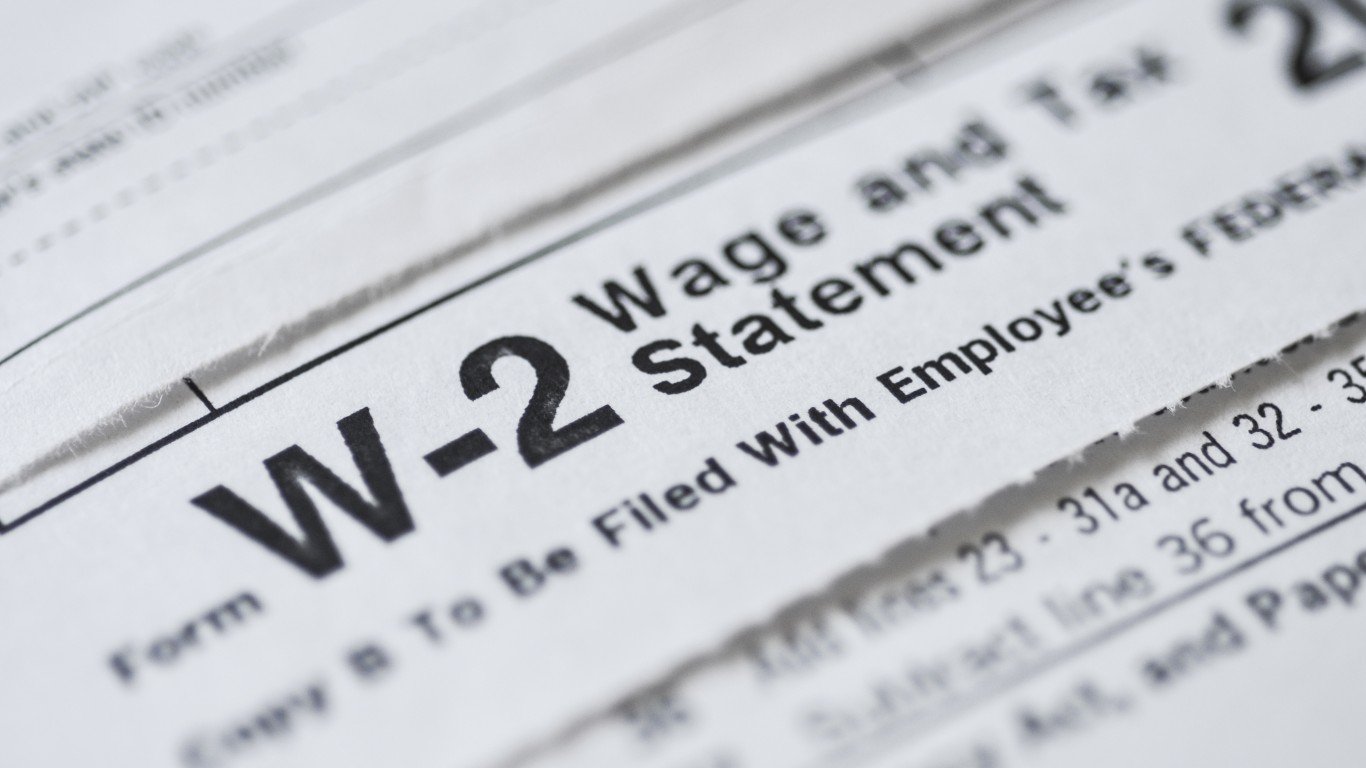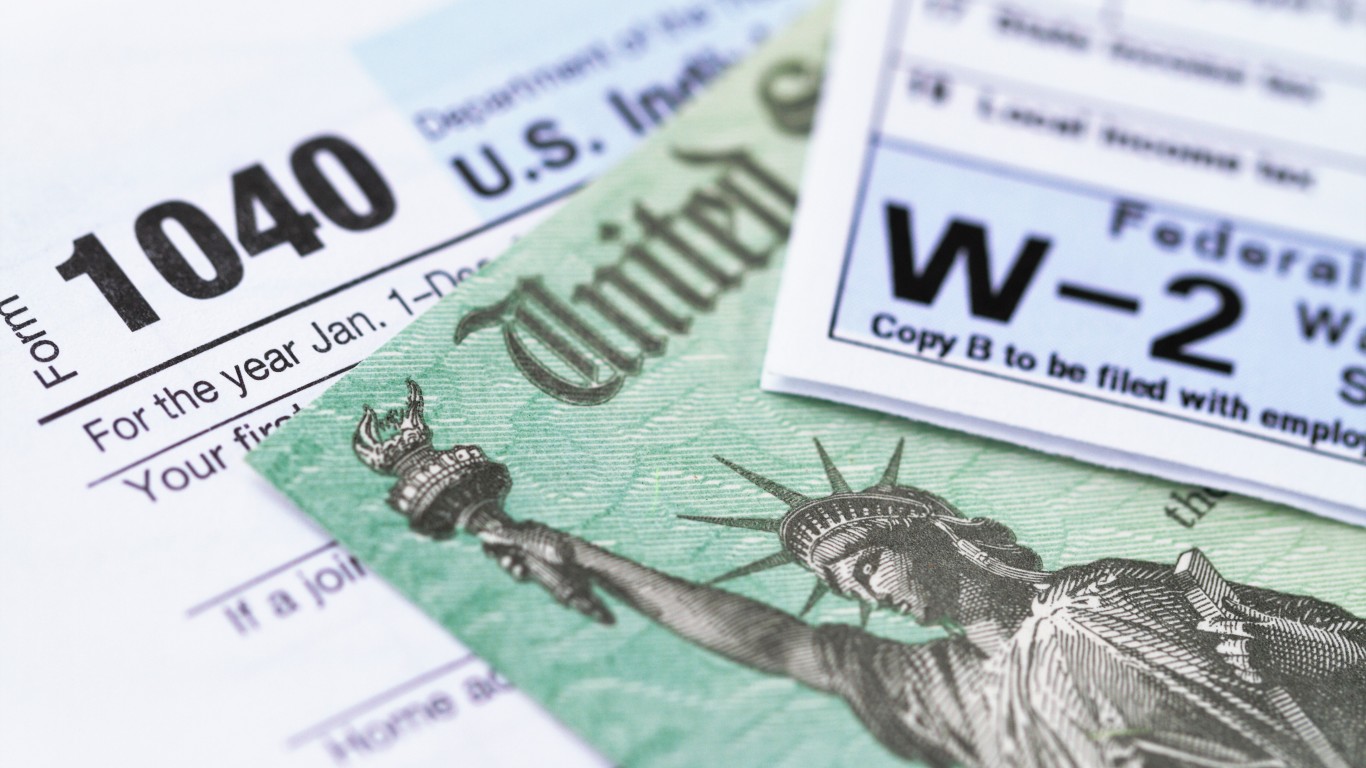

Planning your retirement is an exciting yet daunting task. Despite a lifetime of work, however, many are financially unprepared for retirement: 49% of those ages 55 to 66 had no personal retirement savings in 2017, according to the U.S. Census Bureau’s Survey of Income and Program Participation. Those who are unprepared will have to rely on Social Security benefits in retirement, and they need to know what the tax implications are.
24/7 Wall St. created this list of information about the taxability of Social Security income and other financial advice related to Social Security based on the report Is Social Security Income Taxable? produced by financial technology company SmartAsset.
State and local taxes can have a profound impact on retirees. Income taxes on Social Security retirement benefits and retirement account withdrawals vary widely from state to state. There also are considerable differences between the property and sales tax rates across the country. (Here are states with the highest and lowest property taxes.)
Taxes that retirees pay can vary greatly depending on where they live. Wyoming has no state income tax and low sales and property taxes, so retirees in Wyoming can expect to have a small tax bill. In contrast, Nebraska taxes all retirement income and has high property tax rates. The total tax bill for a retiree in such a state could be thousands of dollars higher. (Here are where people pay the most of their income in state taxes.)
Click here to see if your social security income is taxable.

1. Whether your Social Security will be taxed is determined by your income
Whether you are a single filer or filing jointly, your Social Security income might be taxed if you have other sources of retirement income.
[in-text-ad]

2. How to calculate whether your Social Security income can be taxed
The limit for single filers is $25,000 and for joint filers is $32,000. Any amount filed above these limits will be taxed.

3. Calculating how much your Social Security will be taxed
The amount of taxes you will pay on your Social Security benefits depends on your total combined retirement income. Regardless of the total, you won’t pay more than 85% of your Social Security income.
For the 2021 tax year, single filers with a combined retirement income of $25,000 to $34,000 must pay income taxes on up to 50% of Social Security benefits. If your combined retirement income exceeds $34,000, you’ll pay Uncle Sam up to 85% of your Social Security benefits.
Married couples filing jointly will pay taxes on up to 50% of their Social Security income if they have a combined income of $32,000 to $44,000. If the combined income exceeds $44,000, Uncle Sam will expect taxes on up to 85% of the Social Security benefits.
If 50% of your Social Security benefits are subject to tax, the amount you include in your taxable income will be the lesser of either a) half of your yearly Social Security benefits or b) half of the difference between your combined income and the IRS base amount.

4. How to file Social Security income on your federal taxes
Once you calculate the amount of your taxable Social Security income, you’ll need to enter that amount on your income tax form. Find the total amount of your benefits. This will be in box 3 of your Form SSA-1099. Then, on Form 1040, write the total amount of your Social Security benefits on line 5a and the taxable amount on line 5b.
[in-text-ad-2]

5. Simplifying your Social Security taxes
To withhold taxes from your Social Security benefits, you’ll need to fill out the seven-line Form W-4V, called the Voluntary Withholding Request. Enter your personal information and then select one of four withholding options: 7%, 10%, 12%, or 22% of your monthly benefit. After you have completed the form, mail it to the nearest Social Security Administration office or drop it off there.
You can also file estimated tax payments instead of having the SSA withhold taxes. Estimated payments are tax payments you make four times a year on income that an employer is not required to withhold tax from.

6. Roth IRAs
A Roth IRA is an effective way to reduce your tax liability in retirement. With a Roth IRA, you pay taxes on the money before contributing it to your Roth IRA and you won’t pay any taxes when you withdraw your contributions. You also don’t have to pull out the funds by any specific date once you retire. This is different from traditional IRAs and 401(k) plans, which require you to begin withdrawing money when you turn 72.
[in-text-ad]

7. Making annual catch-up contributions to retirement plans
Many retirement plans allow those who are 50 years old and over to make what are called annual catch-up contributions. You are allowed to make catch-up contributions up to $1,000. These contributions must be made by the due date of your tax return and applied to your 2021 Roth IRA contribution total.

8. State taxes on Social Security benefits
There are 12 states that collect taxes on at least some Social Security income. Two of those states – Minnesota and Utah – follow the same tax rules as the federal government. That means that if you live in one of those states, you’ll pay the state’s regular income tax rates on all of your taxable benefits, up to 85% of your benefits. The other 10 states also follow the federal rules but have deductions or exemptions based on your age or income. In those states, you probably won’t pay tax on the full taxable amount.
The remaining 38 states and Washington, D.C. don’t tax Social Security income.

9. Downsize your home
One way to save in retirement is to downsize your home. Moving to a smaller house could lower your property taxes. This could make a difference in high property tax states such as New Jersey, and it could also lower utilities costs.
[in-text-ad-2]

10. Consider hiring a financial advisor
According to data from Transamerica Center for Retirement Studies, 31% of retirees use a financial services professional to help manage their finances. Think about hiring a financial advisor who can help navigate the complexities of saving and preparing for retirement.
Sponsored: Want to Retire Early? Here’s a Great First Step
Want retirement to come a few years earlier than you’d planned? Or are you ready to retire now, but want an extra set of eyes on your finances?
Now you can speak with up to 3 financial experts in your area for FREE. By simply clicking here you can begin to match with financial professionals who can help you build your plan to retire early. And the best part? The first conversation with them is free.
Click here to match with up to 3 financial pros who would be excited to help you make financial decisions.
Thank you for reading! Have some feedback for us?
Contact the 24/7 Wall St. editorial team.
 24/7 Wall St.
24/7 Wall St. 24/7 Wall St.
24/7 Wall St.


